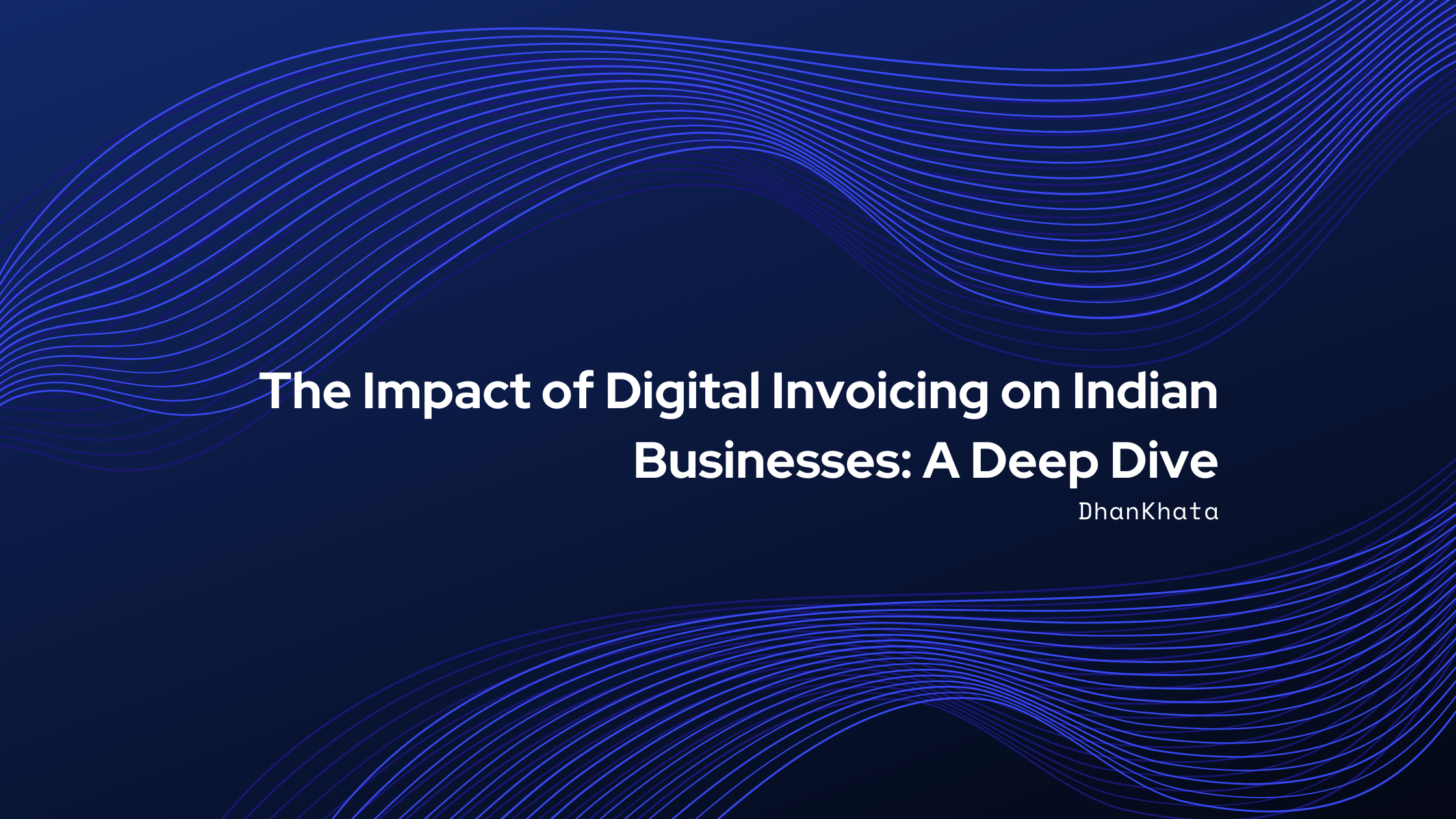Mr Prakash Kumar 1 year ago
The Impact of Digital Invoicing on Indian Businesses: A Deep Dive

Introduction
In today's fast-paced business environment, efficiency and accuracy are paramount. Traditional invoicing methods, which involve paper-based documentation and manual processes, are increasingly being replaced by digital invoicing solutions. In India, a country with a rapidly growing economy and diverse business landscape, the adoption of digital invoicing is transforming how businesses manage their financial transactions. This article delves into the profound impact of digital invoicing on Indian businesses, exploring its benefits, challenges, and future prospects.
What is Digital Invoicing?
Digital invoicing refers to the process of generating, sending, receiving, and managing invoices electronically. Unlike traditional paper invoices, digital invoices are created using software or online platforms, allowing for electronic transmission and storage. This modern approach streamlines invoicing workflows, enhances accuracy, and offers numerous advantages over conventional methods.
Benefits of Digital Invoicing for Indian Businesses
1. Enhanced Efficiency
One of the most significant benefits of digital invoicing is the enhancement of operational efficiency. Traditional invoicing processes often involve manual data entry, printing, and mailing, which can be time-consuming and prone to errors. Digital invoicing automates these tasks, reducing the time spent on invoice creation and processing. For Indian businesses, this means faster invoice turnaround times and quicker access to payment.
2. Cost Savings
Digital invoicing can lead to substantial cost savings for businesses. Eliminating the need for paper, ink, postage, and physical storage reduces operational expenses. Indian SMEs, which often operate on tight budgets, can benefit from these cost savings by reallocating resources to other critical areas of their business. The reduction in administrative overheads also contributes to overall cost efficiency.
3. Improved Accuracy
Manual invoicing processes are susceptible to human errors, such as incorrect data entry or miscalculated totals. Digital invoicing systems minimize these errors by automating calculations and validating data. Invoices are generated with greater accuracy, reducing the likelihood of disputes and discrepancies. For Indian businesses dealing with complex transactions and diverse tax regulations, this improved accuracy is essential for maintaining financial integrity.
4. Faster Payment Cycles
Digital invoicing accelerates the payment cycle by enabling faster invoice delivery and streamlined payment processing. Electronic invoices can be sent instantly via email or through integrated payment gateways, expediting the receipt of payments. Indian businesses can benefit from quicker cash flow, which is crucial for managing working capital and sustaining growth.
5. Better Record-Keeping
Digital invoicing provides a centralized and organized repository for invoice records. Businesses can store, access, and manage invoices electronically, reducing the risk of lost or misplaced documents. This improved record-keeping is especially valuable during audits and financial reviews. Indian businesses can maintain comprehensive and easily retrievable financial records, simplifying compliance and reporting requirements.
6. Compliance with Regulatory Standards
In India, the Goods and Services Tax (GST) has introduced specific requirements for invoicing and tax reporting. Digital invoicing solutions are designed to comply with these regulatory standards, ensuring that invoices meet legal requirements and facilitating seamless GST filing. Indian businesses can stay compliant with tax regulations and avoid penalties by leveraging digital invoicing tools that integrate with GST systems.
7. Enhanced Security
Digital invoicing enhances the security of financial transactions by minimizing the risk of fraud and unauthorized access. Electronic invoices are protected by encryption and access controls, reducing the likelihood of tampering or forgery. For Indian businesses, safeguarding sensitive financial information is crucial in preventing financial losses and maintaining trust with clients and partners.
Challenges and Considerations
While digital invoicing offers numerous benefits, businesses must also be aware of potential challenges and considerations:
1. Implementation Costs
The initial cost of implementing a digital invoicing system, including software or subscription fees, can be a concern for some businesses. However, the long-term cost savings and efficiency gains often outweigh these initial investments. Indian SMEs should evaluate the return on investment and consider the scalability of digital invoicing solutions.
2. Technology Adoption
Transitioning from traditional invoicing methods to digital solutions requires a certain level of technological adoption and training. Employees must be familiar with digital tools and platforms to fully leverage their benefits. Indian businesses should invest in training and support to ensure a smooth transition and maximize the advantages of digital invoicing.
3. Data Privacy and Security
While digital invoicing enhances security, businesses must still address data privacy and security concerns. Ensuring that electronic invoicing systems comply with data protection regulations and implementing robust security measures are essential for safeguarding sensitive information. Indian businesses should choose reputable providers and regularly review their security practices.
The Future of Digital Invoicing in India
The future of digital invoicing in India looks promising, with continued advancements in technology and increasing adoption across industries. The Indian government's push for digital transformation and the implementation of the GST regime are driving the growth of digital invoicing solutions.
As businesses increasingly recognize the benefits of digital invoicing, we can expect to see greater integration with other financial systems, such as accounting software and payment gateways. Additionally, innovations such as artificial intelligence (AI) and machine learning (ML) are likely to enhance the capabilities of digital invoicing platforms, offering even more sophisticated features for managing financial transactions.
Conclusion
Digital invoicing is revolutionizing the way Indian businesses manage their financial transactions, offering a range of benefits from enhanced efficiency and cost savings to improved accuracy and compliance. While there are challenges to overcome, the advantages of digital invoicing make it a valuable tool for businesses seeking to streamline their operations and stay competitive in a rapidly evolving market. As technology continues to advance, digital invoicing will play an increasingly central role in shaping the future of business finance in India. Embracing digital invoicing is not just a trend but a strategic move towards greater efficiency, accuracy, and growth in the modern business landscape.